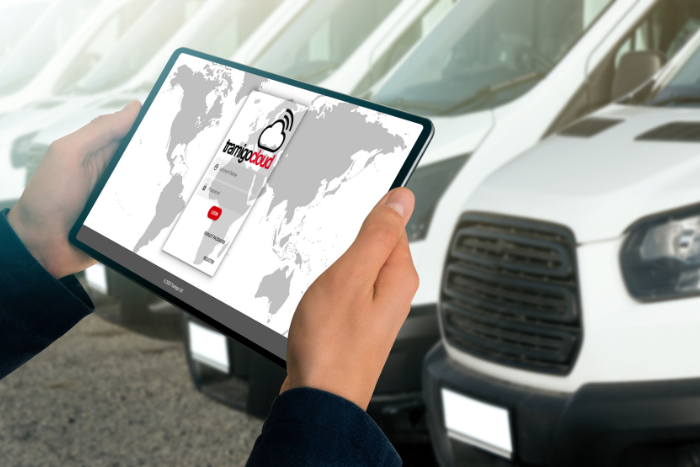
Fleet Management Trends in 2024
Welcome to the world of fleet management in 2024, where technology and sustainability are reshaping the way we manage fleets. From predictive maintenance to data analytics, the latest trends are driving efficiency and cost-effectiveness in the industry. In this article, we will cover the major trends that can be expected to lead the fleet management way to the future. From these trends, you will have a comprehensive insight into the industry, and choose the right option for your fleet operations.
We at Tramigo, with over 20 years of experience in the global market, have been tirelessly working on the optimal solution that can help you track, analyze fleet’s moving performance and prevent any fuel theft. Simply reach out to us at sales@tramigo.com for customized solutions for your business.
6 trends that you need to know for 2024
Trend 1: Predictive Maintenance – A Game Changer in Fleet Efficiency

Predictive maintenance is a transformative trend in fleet management by using real-time data to anticipate vehicle maintenance needs. This proactive approach is all about preventing problems before they occur, minimizing downtime, and saving on emergency repair costs. Companies that have implemented predictive maintenance have reported reduced maintenance expenses and increased vehicle uptime.
The use of analytics in predictive maintenance means analyzing driving patterns, vehicle usage, and even weather conditions to schedule maintenance efficiently. By predicting and preventing vehicle failures, fleets can ensure smoother operations and longer vehicle lifespans, making this a vital trend for the future of fleet management
Trend 2: Advanced Telematics – Enhancing Operational Efficiency
Advanced Telematics in fleet management goes beyond simple GPS tracking. This is a powerful toolset that provides valuable insights into fleet operations, and enables fleet managers to address any potential issues, thereby facilitating smarter decision-making.
Some areas that advanced telematics can greatly benefit fleet management are:
- Enhanced vehicle tracking and monitoring through real-time location, vehicle health diagnostics, and geofencing (virtual boundaries that trigger alerts when vehicles cross the designated area).
- Driver behavior management through harsh driving detection such as harsh braking, speeding, alerts and detailed reports
- Smarter route optimization based on live traffic conditions, multiple-stop planning and dynamic reaction to unexpected changes in real-time
Tramigo software, including Tramigo App and Tramigo Cloud, leverages the most advanced telematics to provide you with the most accurate information about the vehicle’s location, driver’s behavior and vehicle health diagnostics.
Trend 3: Tech-Powered Logistics – Embracing a Digital Future
The fleet management market, expected to reach $52.4 billion by 2027, is experiencing a surge in digital innovations. These tech-powered tools are essential for efficient logistics, aiming to improve efficiency, visibility, and sustainability of fleet operations. These advancements encompass a broad spectrum of technologies, including Artificial Intelligence (AI), Internet of Things (IoT), Cloud Computing, and Big Data Analytics.
For example, FedEx is using IoT devices to monitor the location, temperature, humidity, pressure and shock in its cargo containers. This system alerts fleet managers if the temperature or humidity levels deviate from the specified parameters, preventing damage to sensitive goods.
Trend 4: Mobility-as-a-Service (MaaS) – The Future of Fleet Utilization
Mobility-as-a-service, also known as MaaS, provides access to various transportation options instead of owning a car. The options include public transportation, car rentals, shuttles, and ride-sharing services like Uber. To put simply, think of MaaS as Netflix but for transportation. Projected to grow by 23.3% by 2030, this trend brings positive impacts on society in general by emphasizing efficient vehicle utilization and budget control while reducing environmental impact.

Trend 5: Sustainability – Prioritizing Eco-friendly Practices
Sustainability has become a cornerstone of fleet management, with companies increasingly adopting eco-friendly practices. Some key practices involved in this trend such as the use of alternative fuels like CNG and biofuels, along with the transition to electric vehicles (EVs), are gaining momentum. Besides, route optimization by adopting advanced telematics (as mentioned above) and eco-driving training are becoming more popular to maintain the vehicle’s quality and reduce fuel use.
These sustainable approaches not only help in reducing environmental impact but also lead to operational cost savings, as evidenced by companies like DHL and Amazon setting ambitious goals for clean energy and EV adoption.
Trend 6: Data Analytics – The Backbone of Smart Fleet Management
Data analytics is playing a pivotal role in fleet management, offering insights that drive efficiency and informed decision-making. Predictive analytics can forecast demand, optimize routes, preempt potential issues, and increase customer satisfaction; from which the company will be able to stay competitive in today’s dynamic market. For example, logistics company can monitor driver’s behavior by aggregating and analyzing harsh braking and speeding events. A rental car company can analyze mileage and trips made to predict potential risks and decide on suitable financing options.
An example of software that facilitates smart fleet management by adopting data analytics is Tramigo Cloud. Tramigo Cloud is cloud-based, allowing customers to access from anywhere, track and understand the statistics of every trip and fuel consumption by providing real-time reports with customizable alerts.

The trends in fleet management for 2024 underscore a shift towards more efficient, sustainable, and technology-driven operations. By embracing these trends, fleet operators can not only achieve cost savings but also contribute to environmental sustainability. The future of fleet management is here, marked by innovation and efficiency.
If you have any questions, please don’t hesitate to contact us here. Our local team is happy to assist you with any questions for your business.